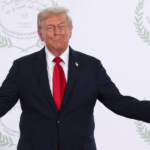In the midst of growing tensions between China and Taiwan, a new investment strategy is gaining momentum, urging investors to consider selling shares of Taiwan Semiconductor Manufacturing Company (TSMC) while favoring the Netherlands-based ASML.
ASML, a Dutch company, has maintained a certain level of insulation from the geopolitical storm, thanks to its high-profile clients, including Intel Corp. and Samsung Electronics Co. The company specializes in providing lithography machines essential in the chip production process.
David Allen, the head of long-short strategies at Plato Investment, managing an impressive A$11 billion ($7 billion) in assets, is steering clear of TSMC and is instead placing his bets on ASML. Although he acknowledges TSMC’s prowess as a company, he expresses reservations about its valuation if geopolitical tensions continue to escalate.
Bruce Kahn, responsible for managing the $159 million Shelton Sustainable Equity fund, has taken the step of divesting TSMC. His rationale is grounded in the increasing geopolitical tensions that have not been fully reflected in the company’s current market valuations, similar to how investors were caught off guard by Russia’s invasion of Ukraine. Kahn emphasizes the unpredictability of risks, stating, “People don’t think anything is going to happen, but that’s the problem with risk – you don’t think anything is going to happen until it does.”
It’s worth noting that these stock predictions may not unfold as anticipated. ASML recently reported a significant drop in orders in the third quarter, leaving the company more dependent on revenue from China. Meanwhile, TSMC’s shares enjoyed a 1.8% surge on Friday, following a quarterly sales outlook that exceeded analysts’ expectations.

Both TSMC and ASML find themselves in the crosshairs of US-China chip tensions. The BlackRock Investment Institute’s geopolitical risk dashboard has assigned a “high” risk rating to US-China relations, with Taiwan marked as the “biggest flashpoint.”
Recent data shows that foreign investors have sold more Taiwanese stocks than they have bought in 2023, erasing nearly $8 billion in inflows recorded in January and February. Taiwan is not alone in experiencing these outflows, as many emerging markets in Asia have seen a foreign exodus from equity markets this year, primarily due to the series of interest rate hikes implemented by the Federal Reserve.
In response to the escalating cross-strait risks, TSMC has been strategically expanding its presence abroad. In August, the company reached an agreement to establish a €10 billion ($11 billion) facility in eastern Germany in collaboration with Infineon Technologies AG, NXP Semiconductors NV, and Robert Bosch GmbH. The German government is set to provide up to €5 billion in subsidies for the factory, with TSMC holding a 70% ownership stake.
TSMC has also committed to investing $40 billion to establish two facilities in Arizona, while seeking up to $15 billion in subsidies from the US. Additionally, the company is in the process of constructing an $8.6 billion plant in Japan, with support from the Japanese government, Sony Group Corp., and Denso Corp.
However, some analysts are wary that TSMC’s diversification efforts may lead to “diseconomies of scale,” resulting in higher unit costs, according to Osmani. On the other hand, ASML, the supplier of machines essential for TSMC’s chip production, stands to benefit from TSMC’s expansion into foreign markets. ASML could witness enhanced opportunities to supply equipment to various sites across different regions, thereby reaping better scale benefits and profit opportunities, as highlighted by Osmani.









